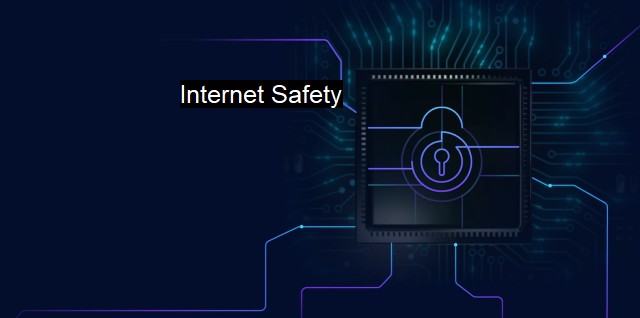What is Internet Safety?
Ensuring Your Safety: Understanding the Importance of Antivirus Software in the Digital World
As the world becomes increasingly digital, it is essential that we take steps to protect ourselves on the internet. Internet safety refers to the measures that we take to protect ourselves and others from potential cybersecurity risks and online threats. One of the most important aspects of internet safety is the use of antivirus software to prevent and mitigate against various online threats.Antivirus software, also known as anti-malware software, is designed to protect computers, smartphones, tablets, and other devices against malicious software, such as viruses, Trojans, worms, and other online threats. Antivirus software works by scanning a device's memory, files, and other components for potential threats and then alerting the users when it detects any suspicious activity.
There are many different types of antivirus software available on the market, ranging from free options to enterprise-level solutions. Some of the most popular antivirus software providers include McAfee, Norton, Avast, Kaspersky, and AVG. it is important to note that no antivirus software can provide a 100% guarantee of protection against cyber threats, so it is essential to use other measures and take precautions to minimize the risks.
Cybersecurity threats can take many forms, including viruses, spyware, ransomware, phishing attacks, and social engineering. Viruses are among the oldest and most common types of malware, designed to replicate themselves and spread to other systems. Spyware is malware that is designed to record personal information, such as keystrokes, browser history, and account passwords. Ransomware is a form of malware that locks a computer or device and demands payment in exchange for the owner regaining access. Phishing attacks commonly take the form of fake emails or websites that trick people into giving away sensitive information, such as login credentials or credit card details. Social engineering involves manipulating people through psychological means to gain access to sensitive information.
The consequences of these threats can be devastating, ranging from financial losses and data breaches to identity theft and reputational damage. Protecting ourselves and our digital assets from these threats is vital for maintaining privacy, safety, and security on the internet.
Apart from using antivirus software, there are a number of other measures that we can take to improve our online safety. One of the most effective is to practice good cyber hygiene, such as regularly updating software, using strong passwords, avoiding excessive sharing of personal information online, and using two-factor authentication.
Another aspect of internet safety that is crucial in today's digital age is protecting children against online predators and inappropriate content. Children are particularly vulnerable to cybercrimes, such as cyberbullying, online grooming, and exposure to inappropriate content. Parents can take steps to protect their children, such as installing parental controls, restricting access to certain websites, and educating them about the potential risks of the internet.
it is important to be aware of the current cybersecurity threats and trends, such as the rise of social media risks and cybersecurity attacks targeting individuals and businesses alike. Ongoing awareness and prevention campaigns can educate the public about the potential risks and provide relevant guidance and tools to prevent issues from occurring.
internet safety is the practice of taking steps to protect ourselves and our digital assets against cyber threats and online risks. Antivirus is a crucial component of internet safety, as it provides automated identification and protection against various types of malware, especially viruses, spyware, ransomware, phishing attacks, and social engineering. there is no single solution to internet safety, and it is important to practice good cyber hygiene, protect our children, and remain up to date with the most current cybersecurity threats and trends to minimize the risks.

Internet Safety FAQs
What is internet safety?
Internet safety refers to the measures and precautions that individuals and organizations take to protect their digital devices, online privacy, and sensitive information from cyber threats such as malware, phishing, and hacking.What are the basic rules for internet safety?
Some basic rules for internet safety include keeping your software updated, using strong passwords, avoiding clicking on suspicious links or downloading attachments from unknown sources, and being cautious when sharing personal information online.What is cybersecurity?
Cybersecurity refers to the technologies, processes, and practices used to protect digital data, networks, and computer systems from unauthorized access, theft, and damage.What is antivirus software?
Antivirus software is a type of program designed to detect, prevent, and remove malicious software such as viruses, worms, and Trojan horses from a computer or other digital devices. It works by scanning files and data for known threats, blocking suspicious behavior, and sometimes removing infected files. External Resources
| | A | | | B | | | C | | | D | | | E | | | F | | | G | | | H | | | I | | | J | | | K | | | L | | | M | |
| | N | | | O | | | P | | | Q | | | R | | | S | | | T | | | U | | | V | | | W | | | X | | | Y | | | Z | |
| | 1 | | | 2 | | | 3 | | | 4 | | | 7 | | | 8 | | |||||||